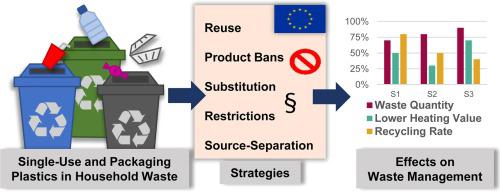Waste Management ( IF 8.1 ) Pub Date : 2021-06-20 , DOI: 10.1016/j.wasman.2021.06.003 Sarah Schmidt 1 , David Laner 1

|
Single-use and packaging plastic (SUPP) strategies are intended to transform the linear make-use-dispose economy of SUPPs into a more circular, resource-efficient one. The aim of this study was to identify optimal SUPP management concepts from a circular-economy-perspective by assessing the effects of different SUPP strategies on household waste management. Data on the generation and management of SUPP-containing household waste in Germany in 2017 were compiled and a material flow model was established. Regulatory SUPP strategies were translated into scenarios (with effects on waste generation and waste composition) and implemented in the material flow model. The effects on material efficiency, waste generation and lower heating values were evaluated and trade-offs between these target dimensions were identified. In Germany in 2017, 32 kg per person and year of SUPP household waste were generated, of which 28 kg per person and year was packaging waste. From a material efficiency perspective, the combination of banning specific non-packaging SUPPs and optimizing source-separation leads to the maximum increase in final recycling rates of SUPPs in household waste, from 38% to 50%. However, in this scenario the amount of SUPP-containing household waste is hardly reduced as compared to the status quo. The trade-offs observed in different waste management target dimensions highlight the importance of understanding the systemic effects of SUPP strategies on waste management in order to identify optimal solutions from a circular-economy-perspective.
中文翻译:

一次性和包装塑料策略对德国家庭垃圾管理的多维影响
一次性和包装塑料 (SUPP) 策略旨在将 SUPP 的线性制造-使用-处置经济转变为更循环、资源效率更高的经济。本研究的目的是通过评估不同 SUPP 策略对家庭废物管理的影响,从循环经济的角度确定最佳 SUPP 管理概念。汇总了2017年德国含SUPP生活垃圾的产生和管理数据,建立了物质流模型。监管 SUPP 策略被转化为情景(对废物产生和废物组成有影响)并在材料流模型中实施。评估了对材料效率、废物产生和较低热值的影响,并确定了这些目标维度之间的权衡。2017年在德国,每人每年产生 32 公斤 SUPP 生活垃圾,其中每人每年产生 28 公斤包装垃圾。从材料效率的角度来看,禁止特定的非包装 SUPP 和优化源头分离相结合,可以最大程度地提高生活垃圾中 SUPP 的最终回收率,从 38% 增加到 50%。然而,在这种情况下,与现状相比,含有 SUPP 的家庭垃圾的数量几乎没有减少。在不同废物管理目标维度中观察到的权衡强调了了解 SUPP 策略对废物管理的系统性影响的重要性,以便从循环经济的角度确定最佳解决方案。从材料效率的角度来看,禁止特定的非包装 SUPP 和优化源头分离相结合,可以最大程度地提高生活垃圾中 SUPP 的最终回收率,从 38% 增加到 50%。然而,在这种情况下,与现状相比,含有 SUPP 的家庭垃圾的数量几乎没有减少。在不同废物管理目标维度中观察到的权衡强调了了解 SUPP 策略对废物管理的系统性影响的重要性,以便从循环经济的角度确定最佳解决方案。从材料效率的角度来看,禁止特定的非包装 SUPP 和优化源头分离相结合,可以最大程度地提高生活垃圾中 SUPP 的最终回收率,从 38% 增加到 50%。然而,在这种情况下,与现状相比,含有 SUPP 的家庭垃圾的数量几乎没有减少。在不同废物管理目标维度中观察到的权衡强调了了解 SUPP 策略对废物管理的系统性影响的重要性,以便从循环经济的角度确定最佳解决方案。在这种情况下,与现状相比,含有 SUPP 的家庭垃圾的数量几乎没有减少。在不同废物管理目标维度中观察到的权衡强调了了解 SUPP 策略对废物管理的系统性影响的重要性,以便从循环经济的角度确定最佳解决方案。在这种情况下,与现状相比,含有 SUPP 的家庭垃圾的数量几乎没有减少。在不同废物管理目标维度中观察到的权衡强调了了解 SUPP 策略对废物管理的系统性影响的重要性,以便从循环经济的角度确定最佳解决方案。


























 京公网安备 11010802027423号
京公网安备 11010802027423号